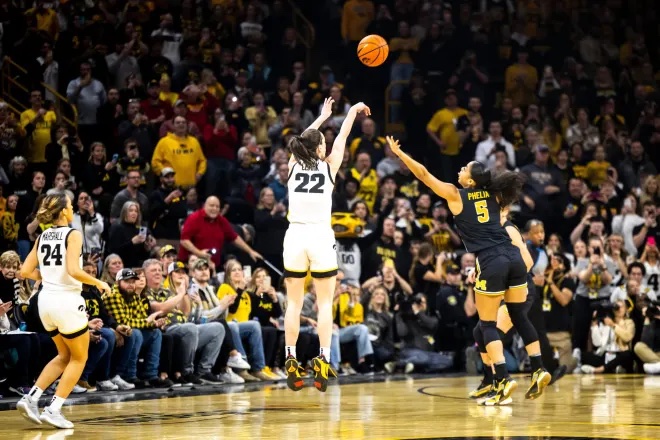
University of Iowa senior guard Caitlin Clark became the all-time leading scorer in NCAA Division I women’s basketball history on Thursday, Feb. 15. It took her two minutes.
Clark had not quite managed to break the record a few days earlier, during Iowa’s close loss to University of Nebraska. In the fourth quarter of that game, eight points away from claiming the all-time leading scorer title, Clark went cold. She recorded the first scoreless fourth quarter of her 125-game college career. Despite Clark’s struggles, the Iowa/Nebraska game—which took place on Super Bowl Sunday—was still the most watched women’s basketball game in FOX Sports history.
Clark came into Sunday’s matchup averaging over 32 points a game, so the expectation that she would break the record against Nebraska was reasonable. Kelsey Plum—the previous record holder—even wrote Clark a congratulatory message on social media before the Hawkeyes’ loss. After the game, Plum corrected herself.
“My bad next game,” she wrote on X (formerly Twitter) with a laughing emoji.
By the time Iowa headed into their Thursday night matchup against the University of Michigan, anticipation was at a fever pitch. 14,998 eager fans packed into Carver-Hawkeye Arena to see Clark shatter Plum’s 2017 record of 3,527 career points. They didn’t have long to wait. After hitting a layup and a three-pointer back-to-back within the first two minutes of the game, Clark was only three points away from the milestone. On Iowa’s next possession, Clark closed the gap in classic fashion: with a 33-foot three-pointer in transition. Iowa won the game 106–89.
“It was perfect,” Iowa coach Lisa Bluder said after the game. “It was absolutely perfect for her to go over and reach this record from the logo.”
As the crowd roared, Bluder called a timeout, and Clark’s teammates mobbed her. In some ways, it was just another celebration for a player who has already received national attention for her deep three-pointers, swagger, and prolific scoring. But Thursday’s laurels were unique. In addition to writing her name in the NCAA record books—reaching the record in fewer games and while taking fewer shots than Plum did—Clark scored a career-high 49 points that night. Of these points, 23 came in the first quarter. She also set Iowa’s program and arena records for the most points scored in a single game.
In short, Clark put on a show, and the world took note.
Clark received shout-outs from former Iowa teammate Monika Czinano, WNBA legend Brittney Griner, Louisiana State University standout Angel Reese, NBA point guard Damian Lillard, and Plum. But it’s not just basketball players who recognize Clark’s impact. Former president Barack Obama, NFL quarterback Tom Brady, and trailblazing tennis player Billie Jean King—as well as analysts and talk show hosts from across the sports world—all weighed in on the record-breaking night. Clark’s performance was even highlighted in the following day’s issue of NPR’s Up First.
Women’s basketball has long struggled for recognition. For context, the NBA recorded a per-game average attendance of 18,077 during the 2022-2023 season. The WNBA’s average attendance for the same season came in at 6,615. 2022-2023 TV viewership stats tell a similar story: NBA regular season games across ABC, ESPN, and TNT averaged 1.6 million viewers per game, even as WNBA coverage across ABC, ESPN, and CBS averaged only 505,000 viewers per game.
Nor are these staggering disparities confined to professional basketball. The 2023 men’s NCAA tournament racked up an average of 9.1 million television viewers per game, a 6% decline from the previous year. Meanwhile, an average of only 983,000 viewers tuned in for 2023 women’s March Madness games. Those numbers marked a 55% viewership increase for the women’s tournament compared to 2022.
It’s clear, then, that “the Caitlin Clark Effect”—the general term for the widespread attention Clark has drawn—does not exist in a vacuum. When Clark sells out arenas, boosts ratings, and smashes records, she’s not just excelling individually. She’s carving out space for players like her to get the recognition they deserve, right alongside their male counterparts. And she’s slowly but surely changing the way all of women’s basketball is perceived.
Clark finished her record-breaking night with 3,569 career points, putting her in range to challenge two important records. Breaking one or both would further cement her legacy across the basketball world.
The first record now in sight: Lynette Woodard’s career scoring record in women’s college basketball. Woodard scored 3,649 points for Kansas in 1981, before the NCAA recognized women’s collegiate sports. Her record still isn’t recognized as an official NCAA milestone.
The second record: Pete Maravich’s all-time NCAA scoring record. If Clark were to surpass Maravich’s 3,667 points, she would have the most points in men’s or women’s NCAA history.
With four games left in the regular season—and with the Big 10 Tournament and March Madness to follow—Clark has a shot at topping both Woodard’s and Maravich’s numbers. And that’s assuming she declares for the WNBA draft instead of returning to Iowa for a fifth year of eligibility because of the COVID-19 pandemic. Iowa fans have made it clear what outcome they prefer; the sellout crowd chanted, “One more year!” after Clark’s performance Thursday night.
Whatever Clark decides to do, and whatever records she does or doesn’t go on to break, she’s already left her mark on the game of basketball. And pretty much everyone knows it.
“What a night for Caitlin Clark,” Des Moines Register columnist Chad Leistikow wrote, the morning after Clark broke the women’s NCAA scoring record. “What a night for women’s basketball.”
Audrey Nelson can be reached at aanelson@wesleyan.edu.


Leave a Reply